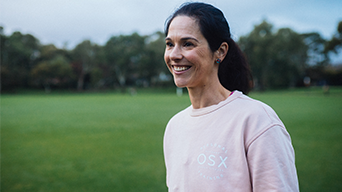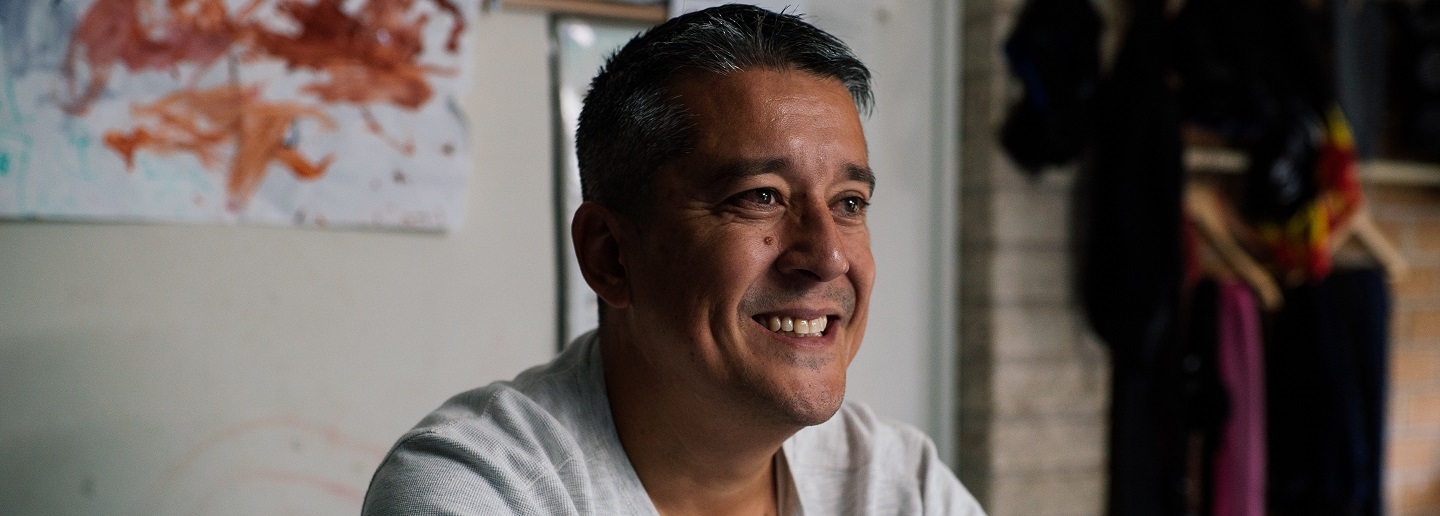Looking after your mental health and wellbeing as a parent
You’re likely aware of the emotional and social support children need to thrive. You’re probably also determined to do everything you can to provide it. This is natural. But children who see adults caring for their wellbeing are likely to see it as important for themselves, too.
If you’re struggling with your mental health and wellbeing, seek support to help you look after yourself.
As a parent, having information and resources to understand and care for your child can help. So can looking after your own mental health as much as possible. Seek support from others when you need to. This can be good for your wellbeing, and your family’s.
You can talk to family, friends or a healthcare professional.
You can also try tools like our K10 test, a quick and informal quiz to see where you’re at right now and identify some things that may help you.
Understanding child mental health
Children and young people with positive mental health feel good about themselves. They’re able to build relationships and express themselves. They can also deal with challenges and adapt to change.
Children’s mental health moves along a continuum. Like an adult. ‘Continuum’ means that a child’s mental health is not fixed. It can move along a range from healthy to struggling, and back again.
While most children experience positive mental health, a child can also struggle. They can develop a mental health condition. It’s important to seek support early.
Visit the Be You website to understand the Mental Health Continuum.
Consider the whole child
It’s important to consider the ‘whole child’ when thinking about your child’s mental health.
You can better understand your child by attempting to understand what’s going on in their world.
A range of factors shapes a child’s life and their mental health and wellbeing:
- their nature (including their biological make-up)
- significant events and experiences that happen to them
- their family, relationships, learning environment and community
- broader systems, such as government public policies and health services.
- support their relationships
- help them develop social and emotional skills
- acknowledge adversity (for example, poverty or neglect).
Your child’s emotions
As children grow, their emotional and social lives become more complex. The ability to understand and manage emotions, thoughts and behaviours in positive ways is called ‘regulation’.
Learning to regulate emotions is a developmental process. It begins when your child is a baby and continues into adulthood. For example, when you soothe a crying baby, you’re helping them regulate their emotions.
Skills for managing a wide range of emotions are important for a child’s mental health and wellbeing. Children do not develop regulation skills by themselves.
They learn from parents and other adults. Your warm and responsive interactions help your child regulate from infancy through to adulthood.
Learn more about regulation on the Raising Children Network website.
Your child's temperament
Children’s personalities, likes, dislikes and the ways they react to situations can vary a lot. Even children in the same family. These kinds of differences make up a child’s ‘temperament’.
You can notice a child’s temperament by paying attention to:
- how they react to people and events
- how they approach new people or situations
- how they manage their own emotions and behaviour.
It’s important to adapt your parenting style to a child’s temperament. This helps support their development and builds your relationship.
Find out more about temperament and parenting approaches on the Raising Children Network website.
Strategies for supporting child mental health
There are likely plenty of things you’re doing to support your child’s mental health and wellbeing.
You may already be using the strategies listed below. Or you might find something new to try.
- Build your relationship with your child.
- Help your child to manage their emotions.
- Keep abreast of how your child is doing in their early learning service or school.
- Know who your child’s friends are.
- Arrange experiences that build on your child’s strengths.
- Allow them to try new things and learn from their mistakes.
- Help them build supportive relationships with other adults.
- Establish family routines, rituals and rules.
- Be a good role model for managing family conflict. Use calm, compromise and negotiation.
- Work together to set goals and solve problems.
- Be there for your child.
- Help your child manage their anxious or upset feelings. Provide attention and support.
- Learn what some common challenges and concerns are for different age groups.
- Encourage and facilitate help-seeking, including professional support, if needed.
Parents don’t have to get everything right. The important thing is that you are there for your child and supporting them to achieve their best possible mental health.
Find strategies to protect your child’s mental health on the Parenting Strategies website.
Child developmental stages: birth to 18
Understanding your child’s mental health based on their developmental stage and age can help you to better support your child.
By knowing what to expect at each stage, you can feel better equipped to navigate the challenges ahead - in turn, supporting the wellbeing of yourself as a parent.
You can also learn more about mental health during pregnancy.

Pregnancy
Find information and resources on what to expect during pregnancy, perinatal depression, looking after your own mental health and supporting someone who’s pregnant.

Toddlers (ages 1 to 3)

Preschool children (ages 3 to 5)

School-age children (ages 6 to 8)

Preteens (ages 9 to 11)

Teens (ages 12 to 18)
Families and adversity
Acknowledging the impact of adversity early and providing support can help children recover.
Adverse childhood experiences
Adverse childhood experiences (ACES) are very stressful events that occur during childhood.
Childhood adversity might come from experiences of:
- loss and grief
- separation or divorce
- physical or emotional neglect
- natural disasters
- a family member falling ill
- family violence or abuse.
These experiences can have an impact on a child’s health, both physical and mental.
Parents and family members have an important role to play in supporting a child’s recovery.
- address the issue with your child early
- provide a positive and caring relationship to help the child adapt and heal
- find out more about ACES to help you understand your child’s behaviours
- strengthen your relationship with your child.
Learn more about ACES and what can help in this fact sheet from Emerging Minds.
Understand how adversity affects children’s development in this Australian Institute of Family Services (AIFS) practice guide.
Family violence
Family violence can happen to people of any gender, sexual orientation or culture. If you’re experiencing family violence, it’s not your fault.
For domestic abuse counselling call 1800RESPECT. You can also speak to your health practitioner.
In an emergency, call 000.
Family violence can be traumatic for children and young people. Your child can recover from the effects of family violence given the right support.
- Talk to your child about what’s happening and help them to feel safe.
- Kids Helpline is a confidential phone and online counselling service for your child.
Developmental delay or disability
- disability
- developmental delay
- learning difficulties.
You might be a parent with a disability – or have a child with a disability. In both situations, looking after your mental health and wellbeing is important. Access services and supports to care for yourself and to lead a full and active life.
Find advocacy services near you on Ask Izzy.
Join a support group for parents and carers of children with disability on MyTime.
Learn about support services for parents with a disability on the Pregnancy, Birth and Baby website.
Parenting with a mental health condition
More than 2 in 5 people have experienced a mental health condition at some stage in their life.
If you are a parent with a mental health condition, it’s important to understand your condition. This can help you look after yourself. It can also help you make plans with your child and family to prepare for both the good and hard days.
Work and financial stress
Juggling the expectations of work and family can be challenging. Many families report experiences of financial stress. This includes having to ask family or friends for financial help or being unable to pay bills on time.
If you’re struggling at work or facing financial hardship, seek help early.
For free national phone financial counselling, you can call the National Debt Helpline.
Depression and anxiety in children and young people
Noticing the signs of depression or anxiety
If you’re worried about your child’s moods or behaviours, the first step is taking time to observe what’s going on.
Signs include:
- persistent worries or unusual fears
- sadness and feelings of hopelessness that don’t go away
- being overly critical of themselves or others
- avoiding particular situations
- avoiding friends or family and wanting to be alone most of the time
- refusing to go to preschool or school on a regular basis
- inability to get along with other children or peer group
- noticeable disinterest or decline in school performance
- frequent aggressive reactions
- frequent, unexplained temper tantrums
- hyperactive behaviour or constant movement
- restrictive or inflexible eating
- difficulty going to sleep or staying asleep
- physical complaints (unexplained aches and pains)
- difficulties with concentration, attention and organisation
- showing a desire to hurt themself or hurting themself.
Having the conversation
If you’re noticing signs of distress, you could try problem-solving with your child or teen. Start by having a conversation with your child or young person. If your child or teen is in preschool or school, you could also have a conversation with their educator.
This can help you share and gather information on your child’s moods, emotions, peer relationships and behaviours outside the home.
Find tips for talking to a young person about their mental health.
Find strategies for First Nations families to talk about social and emotional wellbeing on the ReachOut website.
Seeking support for your child
If issues persist over weeks or interfere with your child’s daily life or relationships, contact a health professional.
If your child is showing warning signs of suicide or self-harm, get help as soon as possible. In an emergency, call 000.
Understand the roles of child health practitioners in this video series by Emerging Minds.
Find helplines for families.
Perinatal depression
Depression can start before or during pregnancy and continue after childbirth. We use perinatal depression to cover the period from conception until your baby is 12 months old.
Antenatal depression is when you experience depression during pregnancy. It affects up to one in 10 women in Australia.
Postnatal depression can develop up to one year after the birth of a child. Up to one in 6 women experience it.
Depression may also return during the pregnancy and birth of another child.
Perinatal anxiety
Helplines for families
It can be hard to know where to start when supporting a child or young person experiencing a mental health challenge. Sometimes, families just need a little help.
These helplines offer information and advice:
- 13YARN – crisis support helpline for First Nations Peoples.
- Butterfly National Helpline – for anyone concerned about eating disorders or body image issues.
- Headspace – for children aged 12 to 25 to chat, email or speak on the phone with a qualified youth mental health professional.
- Kids Helpline – telephone and online counselling service for children and young people aged between 5 and 25.
- Lifeline – crisis support, suicide prevention and mental health support services.
- Perinatal Anxiety and Depression Australia (PANDA) – supports people affected by changes to their mental health and wellbeing from pregnancy and until their baby is 12 months old.
- QLife – webchat and phone peer support and referral service for LGBTIQ+ people and those wanting to support LGBTIQ+ people.










